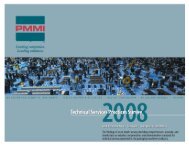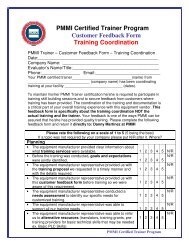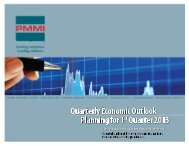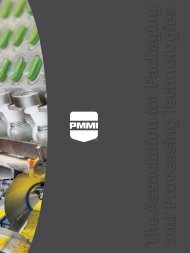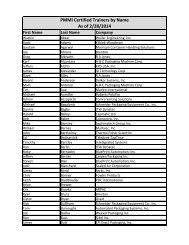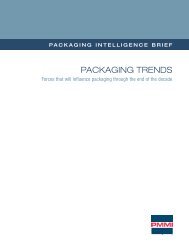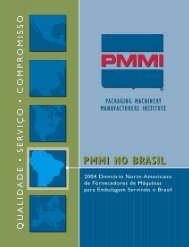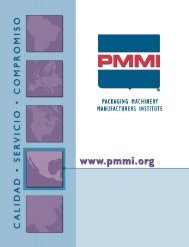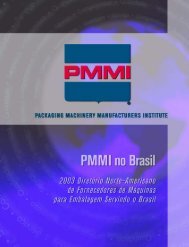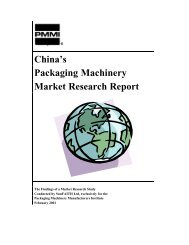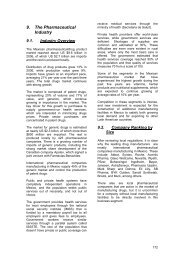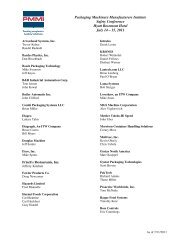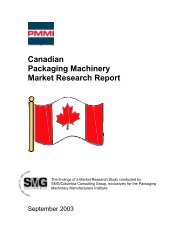Germany Packaging Machinery Market Research Report - PMMI
Germany Packaging Machinery Market Research Report - PMMI
Germany Packaging Machinery Market Research Report - PMMI
Create successful ePaper yourself
Turn your PDF publications into a flip-book with our unique Google optimized e-Paper software.
For this waste treatment, the manufacturers pay a fee to the Dual System. However, the fee payers—<br />
now more than 18,500 firms—all complain that the costs are too high.<br />
From the beginning, the ordinance was very controversial. Only after the introduction of the Product<br />
Recycling and Waste Management Act, and with regard to necessary adjustments to bring it into line<br />
with the EU <strong>Packaging</strong> and <strong>Packaging</strong> Waste Directive, a revision was accepted in August 1998. This<br />
laid down higher quotas for the recycling of used consumer packaging, staggered according to the type<br />
of materials. The focus remains on the avoidance and recycling of packaging waste; also in the future<br />
manufacturers and distributors are obligated to take back the packaging and return it to the cycle as far<br />
as possible.<br />
The Dual System must present annual proof to the environment ministries of the German federal states<br />
that it has fulfilled its responsibilities in a proper way. Companies that do not participate in the Dual<br />
System are responsible for the taking back, recycling, and documenting of their own used consumer<br />
packaging, with the same recycling quota. As a result, several separate private waste disposal<br />
companies were established, and the Duales System Deutschland AG reduced its license fees.<br />
The ‘Grüne Punkt’ (Green Dot) (see section 5.4.1 above) now appears on consumer packaging not only<br />
in <strong>Germany</strong> but in 13 other countries as a symbol for the financing of collection, sorting, and recycling<br />
of packaging through the “Dual System” (see section 5.4.2 above).<br />
For packaging waste arising in households, collection is divided into two different systems. With the<br />
‘collect system’ on the one hand, packaging of plastic, composite materials, aluminum, and tin are<br />
placed by consumers into “yellow bins” or “yellow sacks” and collected directly from individual<br />
households by the waste disposal partners of the Dual System. In some places, paper is also collected<br />
in this way. With the ‘bring system,’ on the other hand, the collected packaging is brought by<br />
consumers to recycling centers or recycling containers, located in the vicinity of the household. Glass,<br />
sorted by color, and paper/cardboard/cartons are mainly collected in this way.<br />
6.2.1.2 Contents of the <strong>Packaging</strong> Ordinance of 1998<br />
Article 1 deals with the objectives of the Ordinance, as mentioned in the previous section.<br />
The purpose of this Ordinance is to avoid or reduce the environmental impacts of waste arising<br />
from packaging. <strong>Packaging</strong> waste shall in the first instance be avoided; reuse of packaging,<br />
recycling and other forms of recovery shall otherwise take priority over the disposal of packaging<br />
waste. By 30 June 2001, the share of all packaging waste being recovered shall be 65% by<br />
weight and the share being recycled shall be 45% by weight. The Federal Government shall<br />
conduct the necessary surveys.<br />
The Ordinance applies to all packaging put into circulation, regardless of its material and where it<br />
arises, insofar as it is not covered by any other special regulations. (Article 2)<br />
Manufacturers and distributors are obliged under Article 4 to accept returned transport packaging.<br />
Under Article 5 the distributor is responsible for the removal or return of secondary packaging. In all<br />
large German supermarkets, various containers are to be seen at the exits, in which the customers can<br />
immediately dispose of secondary packaging, sorted into paper and plastic, after paying for their goods.<br />
The following sections contain the precise text of the relevant Articles:



